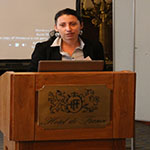Euroacademia Conferences
 Europe Inside-Out: Europe and Europeanness Exposed to Plural Observers (9th Edition) April 24 - 25, 2020
Europe Inside-Out: Europe and Europeanness Exposed to Plural Observers (9th Edition) April 24 - 25, 2020 Identities and Identifications: Politicized Uses of Collective Identities (9th Edition) June 12 - 13, 2020
Identities and Identifications: Politicized Uses of Collective Identities (9th Edition) June 12 - 13, 2020 8th Forum of Critical Studies: Asking Big Questions Again January 24 - 25, 2020
8th Forum of Critical Studies: Asking Big Questions Again January 24 - 25, 2020 Re-Inventing Eastern Europe (7th Edition) December 13 - 14, 2019
Re-Inventing Eastern Europe (7th Edition) December 13 - 14, 2019 The European Union and the Politicization of Europe (8th Edition) October 25 - 26, 2019
The European Union and the Politicization of Europe (8th Edition) October 25 - 26, 2019 Identities and Identifications: Politicized Uses of Collective Identities (8th Edition) June 28 - 29, 2019
Identities and Identifications: Politicized Uses of Collective Identities (8th Edition) June 28 - 29, 2019 The European Union and the Politicization of Europe (7th Edition) January 25 - 26, 2019
The European Union and the Politicization of Europe (7th Edition) January 25 - 26, 2019 7th Forum of Critical Studies: Asking Big Questions Again November 23 - 24, 2018
7th Forum of Critical Studies: Asking Big Questions Again November 23 - 24, 2018 Europe Inside-Out: Europe and Europeanness Exposed to Plural Observers (8th Edition) September 28 - 30, 2018
Europe Inside-Out: Europe and Europeanness Exposed to Plural Observers (8th Edition) September 28 - 30, 2018 Identities and Identifications: Politicized Uses of Collective Identities (7th Edition) June 14 - 15, 2018
Identities and Identifications: Politicized Uses of Collective Identities (7th Edition) June 14 - 15, 2018
Eastern Europe as an Anthropological Construct. Hierarchies of Knowledge and Power in the Foundation of East European Ethnology
-
-

-
Presentation speakers
- Karolina Koziura, Institute of Cultural Studies, Maria Curie-Sklodowska University in Lublin, Poland
- Download presentation
Abstract:
Eastern Europe has been perceived as invented by the Enlightenment and popular for this time expeditions of people from the West to the East in their seeking of the ‘Other’. Later this ‘Other’ has become the subject of first anthropological investigation within the frameworks of: community studies, kinship and social structure, word system and the region to mention just few. Together with bigger interest in Eastern Europe and numbers of fieldworks conducted here, among anthropologists raised new idea on founding the Eastern Europe as a separate field of anthropological investigation. But together with this new conceptualization of Europe, a new problem appeared on the definition of the borders of Eastern Europe. Should Eastern Europe be understood in geographical terms or rather social and cultural? Is the post socialism a new definition of Eastern Europe? What is more, in the process of the formation of Eastern Europe, it looks like Western anthropologist forgot about their Eastern colleagues and the traditions of national ethnographies here. In my presentation, I would like to show, in which way Eastern Europe is described in Western anthropological literature and in which way perceive themselves ethnologist from this area. It is visible that so-called ‘native anthropologists’ almost do not exist in Western works and give the power of their representation to Western colleagues. I will try to answer the question posed by Chris Hann, why we are marginalized in the international area? It looks like, that the category of ‘orientalism’ implemented to the Humanities by Edward Said understood as the set of discourses practices in which ‘West’ describe ‘East’ together with the concept of ‘Other’ can explain the existence of hierarchies of knowledge and power in modern anthropology. Finally, based on my speech and my own fieldwork conducted for more than 5 years in Ukraine, I would like to propose my own definition of Eastern Europe and its borders.
-
Related Presentations


















